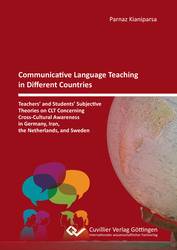| Fachbereiche | |
|---|---|
| Buchreihen (96) |
1381
|
| Nachhaltigkeit |
3
|
| Gesundheitswesen |
1
|
| Geisteswissenschaften |
2370
|
| Medienwissenschaften | 16 |
| Theologie | 57 |
| Philosophie | 102 |
| Rechtswissenschaft | 424 |
| Wirtschaftswissenschaften | 851 |
| Sozialwissenschaften | 418 |
| Sportwissenschaften | 48 |
| Psychologie | 233 |
| Pädagogik | 190 |
| Geschichtswissenschaften | 183 |
| Kunstwissenschaften | 111 |
| Kulturwissenschaften | 166 |
| Literaturwissenschaften | 117 |
| Sprachwissenschaften | 88 |
| Naturwissenschaften |
5408
|
| Ingenieurwissenschaften |
1795
|
| Allgemein |
98
|
|
Leitlinien Unfallchirurgie
5. Auflage bestellen |
|
Erweiterte Suche
Communicative Language Teaching in Different Countries
Teachers’ and Students’ Subjective Theories on CLT Concerning Cross-Cultural Awareness in Germany, Iran, the Netherlands, and Sweden
Parnaz Kianiparsa (Autor)Vorschau
Inhaltsverzeichnis, PDF (110 KB)
Leseprobe, PDF (240 KB)
Communicative Language Teaching (CLT) is a teaching approach which was first introduced in the late 1960s in the US and UK and shifted the focus of language teaching from language awareness to language use and function. CLT aims to make students communicatively competent in terms not only of linguistic, but also socio-linguistic and strategic competence. CLT is seen as one of the approaches which can help learners develop their skills, knowledge, and abilities for effective communication, resulting in its worldwide application in different contexts. However, from the outset, there was no clear agreement about its principles and techniques, and teachers faced problems in describing and applying it. Consequently, CLT has been broadly examined and investigated in different teaching contexts, especially EFL settings. However, there are only a few studies which explore the appropriacy and cultural components of this approach in international contexts. This study was therefore designed to explore upper-secondary school teacher and student attitudes and beliefs towards: (1) the implementation of CLT and their English classes and (2) the inclusion of cultural and intercultural aspects in the principles of CLT and as a result their English classes, with a focus on the development of Intercultural Communicative Competence (ICC), as determined by current foreign language teaching policy in many countries.
| ISBN-13 (Printausgabe) | 9783736990746 |
| ISBN-13 (E-Book) | 9783736980747 |
| Buchendformat | A5 |
| Sprache | Englisch |
| Seitenanzahl | 342 |
| Umschlagkaschierung | glänzend |
| Auflage | 1. Aufl. |
| Erscheinungsort | Göttingen |
| Promotionsort | Augsburg |
| Erscheinungsdatum | 02.09.2015 |
| Allgemeine Einordnung | Dissertation |
| Fachbereiche |
Kulturwissenschaften
Anglistik und Amerikanistik |
| Schlagwörter | Communicative Language Teaching (CLT), Teachers' and Students' Beliefs, EFL Contexts, Intercultural/Cross-Cultural Awareness |








